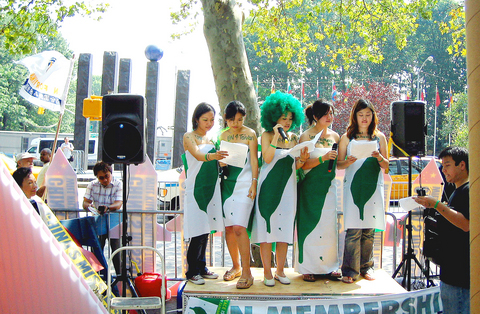Taiwan's Minister of Foreign Affairs Mark Chen (陳唐山) yesterday questioned the UN's ability to uphold justice after Taiwan failed for the 13th straight year to attain a seat in the world body, a move that has been blocked since 1993 by archrival China and its allies.
"China has such a great influence in the UN. I really don't know through which door Taiwan is likely to gain entrance, and we need to reconsider our strategy carefully," Chen said.
Chen said that the failure would not set back "our determination to participate in this international organization, as it is a matter that concerns the whole country's interests."

PHOTO: CNA
According to the Ministry of Foreign Affairs (MOFA), it had this year adopted a new strategy of "presenting two proposals."
The first proposal urged the UN General Assembly to "ensure the representation of the 23 million people of Taiwan in the UN" -- as Taiwan had appealed in the past -- while the second requested "a proactive role by the UN in maintaining peace in the Taiwan Strait."
It was the first time that Taiwan brought a second proposal to the UN, aimed at urging both sides of the Strait to resolve disputes through peaceful means, and requesting UN Secretary-General Kofi Annan to appoint a special envoy or a fact-finding mission to evaluate the security situation in the Strait.
The two proposals were placed in different categories on the agenda and MOFA hoped that they could be discussed separately in the General Assembly. However, the chairman of the meeting decided to go with the Pakistani representative's suggestion during the procedure discussion, as a result of which the two proposals were merged.
After a 45-minute discussion in the form of a two-on-two debate on whether to put the merged proposal on the agenda for the UN's 60th session, the two proposals were both excluded.
China and its firm ally Pakistan, and Taiwan's diplomatic allies Gambia and Chad took part in the debate, while the chairman dis-missed a request by the Solomon Islands' representative to speak for Taiwan.
Chen said that he was not satisfied with the manner in which the General Assembly dealt with Taiwan's bid, questioning the UN's role in upholding justice.
"China used unusual techniques to merge the two proposals into one and didn't allow members to adequately discuss the two proposals," Chen said.
He also said that Taiwan's second proposal put pressure on China in the discussion process. "That's why China tried to merge the two proposals together," Chen said.
"As it is the 60th session of the UN conference, lots of reform proposals jammed the schedule. We can understand the consideration of time constraints. However, Taiwan's interests were sacrificed because of this," Chen said.
During a press conference Chen said that he deeply appreciated Taiwan's diplomatic allies speaking for the nation in the General Assembly, and appealed to them to continue promoting Taiwan's proposal in the UN's formal session.
also see story:
UN approves less ambitious goals statement in vote

Taiwan yesterday denied Chinese allegations that its military was behind a cyberattack on a technology company in Guangzhou, after city authorities issued warrants for 20 suspects. The Guangzhou Municipal Public Security Bureau earlier yesterday issued warrants for 20 people it identified as members of the Information, Communications and Electronic Force Command (ICEFCOM). The bureau alleged they were behind a May 20 cyberattack targeting the backend system of a self-service facility at the company. “ICEFCOM, under Taiwan’s ruling Democratic Progressive Party, directed the illegal attack,” the warrant says. The bureau placed a bounty of 10,000 yuan (US$1,392) on each of the 20 people named in

The High Court yesterday found a New Taipei City woman guilty of charges related to helping Beijing secure surrender agreements from military service members. Lee Huei-hsin (李慧馨) was sentenced to six years and eight months in prison for breaching the National Security Act (國家安全法), making illegal compacts with government employees and bribery, the court said. The verdict is final. Lee, the manager of a temple in the city’s Lujhou District (蘆洲), was accused of arranging for eight service members to make surrender pledges to the Chinese People’s Liberation Army in exchange for money, the court said. The pledges, which required them to provide identification

Nine retired generals from Taiwan, Japan and the US have been invited to participate in a tabletop exercise hosted by the Taipei School of Economics and Political Science Foundation tomorrow and Wednesday that simulates a potential Chinese invasion of Taiwan in 2030, the foundation said yesterday. The five retired Taiwanese generals would include retired admiral Lee Hsi-min (李喜明), joined by retired US Navy admiral Michael Mullen and former chief of staff of the Japan Self-Defense Forces general Shigeru Iwasaki, it said. The simulation aims to offer strategic insights into regional security and peace in the Taiwan Strait, it added. Foundation chair Huang Huang-hsiung

’DISTORTION’: Beijing’s assertion that the US agreed with its position on Taiwan is a recurring tactic it uses to falsely reinforce its sovereignty claims, MOFA said The Ministry of Foreign Affairs (MOFA) yesterday said Chinese state media deliberately distorted Taiwan’s sovereign status, following reports that US President Donald Trump agreed to uphold the “one China” policy in a phone call with Chinese President Xi Jinping (習近平). During the more than one-hour-long call, Xi urged Trump to retreat from trade measures that roiled the global economy and cautioned him against threatening steps on Taiwan, a Chinese government summary of the call said. China’s official Xinhua news agency quoted Xi as saying that the US should handle the Taiwan issue cautiously and avoid the two countries being drawn into dangerous